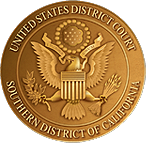Related Research Articles

Steinway & Sons, also known as Steinway, is a German-American piano company, founded in 1853 in Manhattan by German piano builder Heinrich Engelhard Steinweg. The company's growth led to the opening of a factory in New York City, United States, and later a factory in Hamburg, Germany. The factory in the Queens borough of New York City supplies the Americas, and the factory in Hamburg supplies the rest of the world.
A trademark is a word, phrase, or logo that identifies the source of goods or services. Trademark law protects a business' commercial identity or brand by discouraging other businesses from adopting a name or logo that is "confusingly similar" to an existing trademark. The goal is to allow consumers to easily identify the producers of goods and services and avoid confusion.

The Lanham (Trademark) Act (Pub.L. 79–489, 60 Stat. 427, enacted July 5, 1946, codified at 15 U.S.C. § 1051 et seq. is the primary federal trademark statute of law in the United States. The Act prohibits a number of activities, including trademark infringement, trademark dilution, and false advertising.
Trademark dilution is a trademark law concept giving the owner of a famous trademark standing to forbid others from using that mark in a way that would lessen its uniqueness. In most cases, trademark dilution involves an unauthorized use of another's trademark on products that do not compete with, and have little connection with, those of the trademark owner. For example, a famous trademark used by one company to refer to hair care products might be diluted if another company began using a similar mark to refer to breakfast cereals or spark plugs.

Playboy Enterprises, Inc. v. Welles 60 F. Supp. 2d 1050 was a United States district court case between former 1981 Playboy Playmate of the Year ("PMOY") Terri Welles and Playboy Enterprises, Inc. in which Welles was accused of trademark infringement and trademark dilution in her use of Playboy's trademarked terms in the metatags of her website.
1-800 Contacts Inc. is an American contact lens retailer based in Draper, Utah. The brands that 1-800 Contacts use includes Johnson & Johnson Vision Care, Alcon, Bausch & Lomb and CooperVision. In 2006, its last year as a public company, the company reported net sales of US$247 million.
In the United States, trademark law includes a fair use defense, sometimes called "trademark fair use" to distinguish it from the better-known fair use doctrine in copyright. Fair use of trademarks is more limited than that which exists in the context of copyright.
People for the Ethical Treatment of Animals v. Doughney, 263 F.3d 359, was an important Internet domain trademark infringement decision by the United States Court of Appeals for the Fourth Circuit.

A trademark is a type of intellectual property consisting of a recognizable sign, design, or expression that identifies products or services from a particular source and distinguishes them from others. The trademark owner can be an individual, business organization, or any legal entity. A trademark may be located on a package, a label, a voucher, or on the product itself. Trademarks used to identify services are sometimes called service marks.

Planned Parenthood Federation of America, Inc. v. Bucci, 42 U.S.P.Q.2d 1430, an early Internet domain trademark infringement case heard in the United States District Court for the Southern District of New York, established the theory that hosting a site under a domain name that was the registered trademark of a third party constituted trademark infringement. The case was also important in determining what constitutes "Use in Commerce" under the Lanham Act in cyberspace. Although these holdings were modified and overruled by various American courts following the decision, Bucci stands as a seminal case for being one of the first cases to address these issues.

Google, Inc. v. American Blind and Wallpaper Factory, Inc., No. 5:03-cv-05340, was a decision of the United States District Court for the Northern District of California that challenged the legality of Google's AdWords program. The court concluded that, pending the outcome of a jury trial, Google AdWords may be in violation of trademark law because it (1) allowed arbitrary advertisers to key their ads to American Blind's trademarks and (2) may confuse search-engine users initially interested in visiting American Blind's website into visiting its competitors' websites.

The case Brookfield Communications, Inc. v. West Coast Entertainment Corporation, 174 F.3d 1036, heard by the United States Court of Appeals for the Ninth Circuit, established that trademark infringement could occur through the use of trademarked terms in the HTML metatags of web pages when initial interest confusion was likely to result.
Lamparello v. Falwell, 420 F.3d 309, was a legal case heard by the United States Court of Appeals for the Fourth Circuit concerning allegations of cybersquatting and trademark infringement. The dispute centered on the right to use the domain name fallwell.com, and provides discussion on cybersquatting as it applies to criticism of a trademark.
Playboy v. Netscape, 354 F.3d 1020 was a case regarding trademark infringement and trademark dilution decided by the United States Court of Appeals for the Ninth Circuit. Playboy Enterprises Inc. took legal action against Netscape Communications Corp. and Excite, Inc., accusing them of infringement and dilution of Playboy's marks "playboy" and "playmate".
Omega S.A. v. Costco Wholesale Corp., 541 F.3d 982, was a case decided by the Ninth Circuit Court of Appeals that held that in copyright law, the first-sale doctrine does not act as a defense to claims of infringing distribution and importation for unauthorized sale of authentic, imported watches that bore a design registered in the Copyright Office. It is contrasted with Kirtsaeng v. John Wiley & Sons, Inc.
Trademark infringement is a violation of the exclusive rights attached to a trademark without the authorization of the trademark owner or any licensees. Infringement may occur when one party, the "infringer", uses a trademark which is identical or confusingly similar to a trademark owned by another party, in relation to products or services which are identical or similar to the products or services which the registration covers. An owner of a trademark may commence civil legal proceedings against a party which infringes its registered trademark. In the United States, the Trademark Counterfeiting Act of 1984 criminalized the intentional trade in counterfeit goods and services.

Network Automation, Inc. v. Advanced Systems Concepts, Inc., 638 F.3d 1137 was a court case decided on March 8, 2011, where the United States Court of Appeals for the Ninth Circuit ruled that the use of a competitor's trademark as an Internet search advertising keyword did not constitute trademark infringement. In the case, Network Automation advertised their own competing product in search queries that contained Advanced Systems Concepts' "ActiveBatch" trademark. In determining whether trademark infringement occurred, the court evaluated factors relevant to the likelihood of customer confusion outlined in AMF Inc. v. Sleekcraft Boats and concluded that confusion was unlikely.

Grotrian-Steinweg, known as Grotrian in the US, is a German manufacturer of prestige pianos. The company is based in Braunschweig, Germany, commonly known as Brunswick in English. Grotrian-Steinweg makes premium grand pianos and upright pianos.
Rosetta Stone v. Google, 676 F.3d 144, was a decision of the United States Court of Appeals for the Fourth Circuit that challenged the legality of Google's AdWords program. The Court overturned a grant of summary judgment for Google that had held Google AdWords was not a violation of trademark law.
References
- 1 2 3 Brookfield Communications Inc. v. West Coast Entertainment Corporation, 174 F.3d 1036 Archived 2009-09-29 at the Wayback Machine (9th Cir. 1999).
- 1 2 3 4 Rothman, Jennifer E., Initial Interest Confusion: Standing at the Crossroads of Trademark Law , 27 Cardozo Law Review 105 (2005).
- ↑ United States Court of Appeals, Second Circuit. "523 F.2d 1331: Grotrian, Helfferich, Schulz, Th. Steinweg Nachf., Plaintiff-appellant, v. Steinway & Sons, Defendant-appellee". Justia US Law. Retrieved February 14, 2012.(2d Cir. 1975)
- ↑ Grotrian, Helfferich, Schulz, Th. Steinweg Nachf. v. Steinway & Sons, 365 F. Supp. 707, 717 (S.D.N.Y. 1973).
- ↑ Mobil Oil Corp. v Pegasus Petroleum Corp., 818 F.2d 254 (2d Cir. 1987).
- 1 2 Playboy Enterprises, Inc. v. Netscape Communications Corp., 354 F.3d 1020 Archived 2010-05-17 at the Wayback Machine (9th Cir. 2004).
- ↑ Goldman, Eric, Deregulating Relevancy in Internet Trademark Law , 54 Emory Law Journal 559 (2005).
- ↑ Coleman, Ronald, De Minimis Confusion on the Internet: Compounding the Error of Initial Interest , 3 Journal of Internet Law (October 2003).
- ↑ Pink, Jonathan, Initial Interest Confusion Doctrine Archived 2005-08-11 at the Wayback Machine , IP Frontline (Jul. 6, 2005).
- ↑ Kravitz, Jason C., Initial Interest Confusion: Dispelling Some of the Confusion , Massachusetts Lawyers Weekly (Aug. 23, 2004).
